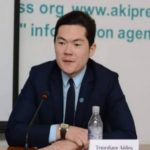On 23 November 2022, Yerevan, the capital of Armenia, hosted the Collective Security Council Summit of the Collective Security Treaty Organization (CSTO). Armenia, which refused to sign the final declaration after the summit, blamed the organization for its attitude in the Second Karabakh War with Azerbaijan and border conflicts. In addition, the summit came to the agenda of international public opinion due to the appointment of the Former Prime Minister of Kazakhstan, Imangali Tasmagambetov, as the Secretary General of the CSTO.
In this context, Ankara Center for Crisis and Policy Studies (ANKASAM) presents the opinions of Aybek Tenizbayev, a lecturer at the Kyrgyz Republic Presidential Public Administration Academy, to evaluate the CSTO Yerevan Summit and the developments that may occur in the future of the organization.
- How would you interpret Armenia’s reaction at the meeting of the CSTO Collective Security Council in Yerevan?
The problems between Armenia and Azerbaijan continue to affect the CSTO. It is also possible that this issue will come to the agenda of the CSTO more frequently. Because, although Azerbaijan is not a member of the organization, it has close relations with member states other than Armenia. Therefore, each country has its national interests independent of its approach to the CSTO. This brings the CSTO to care about Azerbaijan. Armenia, on the other hand, is uncomfortable with such a picture.
The CSTO Statute foresees the strengthening of regional peace and therefore the security environment and in this context, emphasizes the sovereignty, territorial integrity, and independence of the member states. According to the document, the priority of the CSTO in its policy towards these purposes is not based on using military means and is based on not intervening in matters that fall under the national jurisdiction of the countries. However, various paragraphs in the statute also contain some contradictions. Considering the national interests of the states, the effectiveness of the CSTO is open to discussion. For example, Russia’s intervention in Ukraine is fundamentally against CSTO values. It cast a shadow over Russia’s unifying role. Moreover, member states consider that the CSTO does not meet expectations in matters that concern them. Examples of this are Yerevan’s attitude in the conflict between Azerbaijan and Armenia, or Bishkek’s criticisms of the border issue between Kyrgyzstan and Tajikistan.
At this point, there is a tendency by Russia and Belarus to prevent the disintegration of the CSTO and to turn it into a tool in the conflict with the West. However, reaching a consensus on this issue does not seem easy. All these issues undermine the harmony between the CSTO states and the member states and bring up withdrawal discussions. This is what Yerevan has done.
- Another prominent development regarding the summit is the announcement that Former Kazakh Prime Minister Imangali Tasmagambetov will take over the post of General Secretary of the CSTO at the beginning of 2023. What do you think about this change?
For the first time, the representative of a Central Asian country was appointed as the Secretary General of the CSTO. It can be predicted that this decision will have a positive impact on the relations on the Moscow-Astana line. However, the resolution is likely not only in terms of Kazakhstan-Russia relations; at the same time, it can be said that it is a new step in terms of relations between all member states. This move was aimed to increase the membership of the member states to the CSTO, and it tried to show that the CSTO is an organization that considers the interests of all members.
- The year 2022 has been the most difficult in the history of the CSTO. What do you think the CSTO can do to increase its role in the region?
Frankly, it should be emphasized that the view that the CSTO will dissolve soon is unrealistic. Despite the crises, the organization caters to the needs of all member states in terms of security. Russia’s influence in the region continues. However, it can be foreseen that the CSTO will focus on resolving the issues that cause internal conflicts to become a more prestigious organization. There is also a message given by the CSTO with Tasmagambetov as the Secretary-General. The CSTO strives to become a platform based on the equality of states and advocating solving problems through diplomatic means. Only in this way will the further development of the organization be possible. In other words, the CSTO ceased to be a completely pro-Russian institution; it should turn into a structure that defends the interests of each country.
Aybek Tenizbayev

Political Scientist Aybek Tenizbaev, who is a lecturer at the Kyrgyzstan Presidency Public Administration Academy, completed his undergraduate education at the Kyrgyzstan Presidency Public Administration Academy, continued his education at Sakarya University, Department of Political Science and Public Administration and graduated in 2021. He is currently among the leading young political scientists in Kyrgyzstan.
